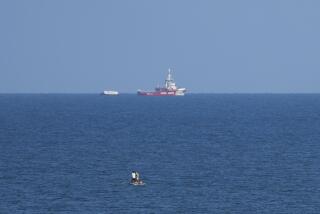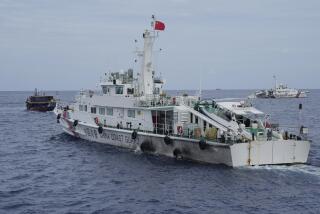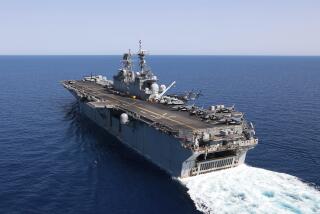New Shipping Rules Bring Turkey Into Conflict with Russia, Neighbors
- Share via
ISTANBUL, Turkey — Giving no leeway to criticism from Russia, Greece and Black Sea countries, Turkey on Friday imposed new safety regulations on the Turkish straits, one of the world’s busiest international waterways--and one that is also potentially hazardous.
Speaking on a quayside decked with flags in honor of the young Turkish republic’s 1926 declaration of sovereignty over its territorial waters, Ibrahim Tez, the minister in charge of shipping, promised that Turkey had no intention of blocking free passage of commercial ships as guaranteed by the 1936 Montreux Convention.
“The basic philosophy is to make free passage mean safe passage,” Tez said. “Ships passing through the straits have grown unimaginably in size, tonnage, speed, loads and environmental hazards. But the physical dimensions of the straits remain the same.”
In 1936, one or two ships a day passed through the Turkish straits, the name for the 180-mile waterway from the Aegean Sea to the Black Sea through the Dardanelles, the Sea of Marmara and the Bosporus.
But in 1993, a record 64 foreign-flag ships a day, plus a similar number of Turkish vessels, passed through. More can be expected as Europe’s canal systems expand and Russia loses easy access to Baltic ports.
Under the Montreux Convention, even inexperienced captains are not required to take aboard a pilot to guide them through the Bosporus, a tricky waterway that narrows to half a mile or so and is plagued by fast, shifting currents.
Apart from much stricter controls over positions in shipping lanes, the new regulations mainly set down in writing what Turkish controllers were doing already: Since a bad oil tanker accident in March, tankers and ships longer than 660 feet have been restricted to daylight hours and one-way traffic.
Moscow has said it will not recognize the new regulations, saying they will lead to a buildup of ships waiting to pass through. Other articles allowing controllers to close down the straits or to refuse passage to “dangerous” ships also worry Russia and other Black Sea states that rely on the straits for access to the world’s warm-water seas.
“The regulations . . . are blatantly against Montreux Convention and the international norms relating to international waterways,” the Russian Embassy in Turkey said in a statement.
Behind the scenes, Russia and Turkey are also struggling over which route will be used to bring oil from new fields in Siberia, Central Asia and Azerbaijan.
Moscow wants to use the Black Sea port of Novorossisk; Turkey wants the fee-paying pipelines over its territory.
The Turkish Foreign Ministry says Russia plans to ship up to 100 million tons of crude a year from Novorossisk, a load for about three huge tankers a day.
The new regulations could limit oil shipping during the day.
“The Turkish straits cannot be considered an oil transportation route,” the Foreign Ministry said. “The building of oil pipelines over Turkish territory . . . is feasible, environmentally much safer and more secure and logical in every sense.”
More to Read
Sign up for Essential California
The most important California stories and recommendations in your inbox every morning.
You may occasionally receive promotional content from the Los Angeles Times.













